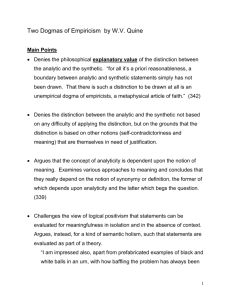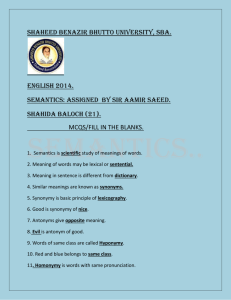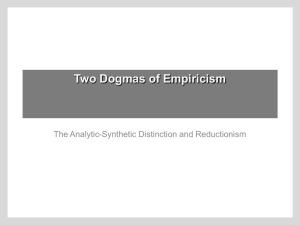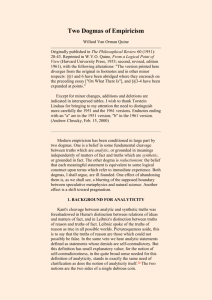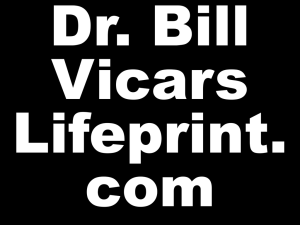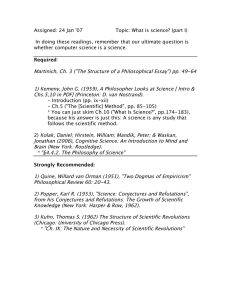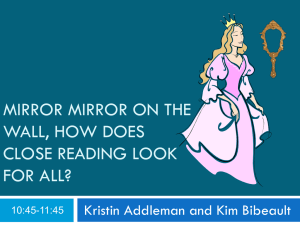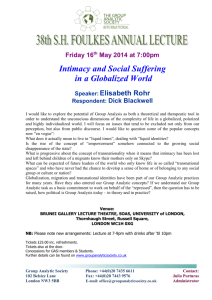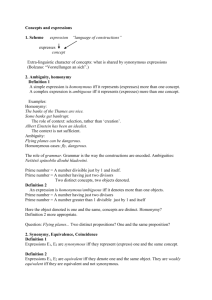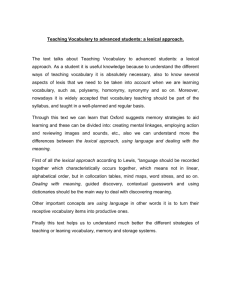Notes on Quine
advertisement
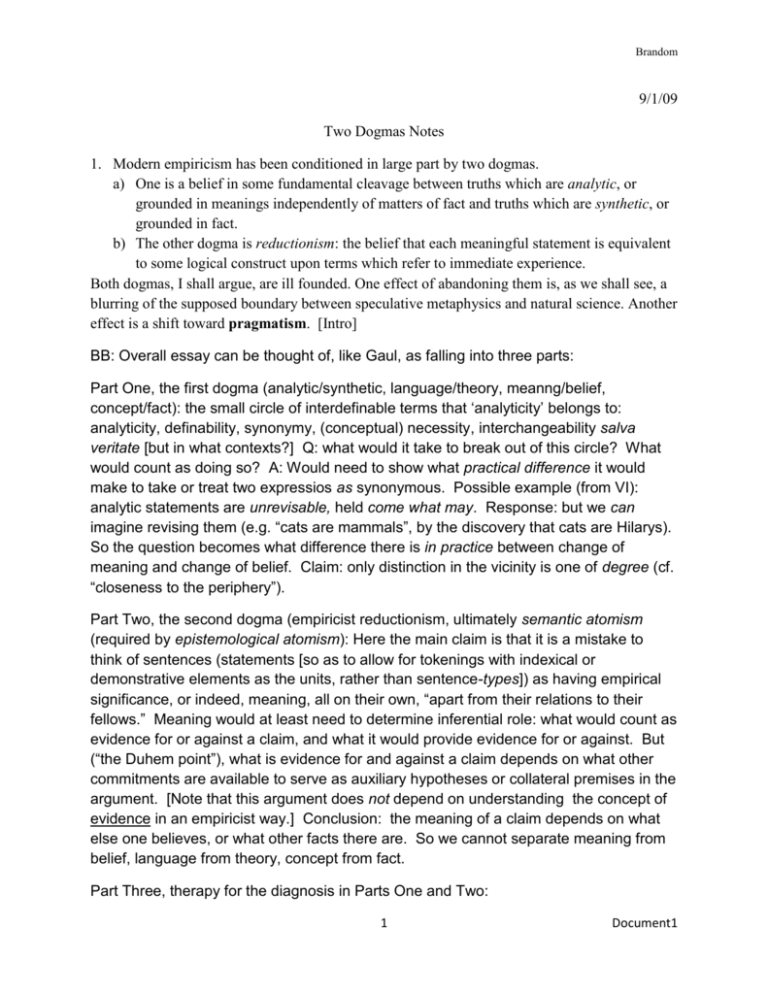
Brandom 9/1/09 Two Dogmas Notes 1. Modern empiricism has been conditioned in large part by two dogmas. a) One is a belief in some fundamental cleavage between truths which are analytic, or grounded in meanings independently of matters of fact and truths which are synthetic, or grounded in fact. b) The other dogma is reductionism: the belief that each meaningful statement is equivalent to some logical construct upon terms which refer to immediate experience. Both dogmas, I shall argue, are ill founded. One effect of abandoning them is, as we shall see, a blurring of the supposed boundary between speculative metaphysics and natural science. Another effect is a shift toward pragmatism. [Intro] BB: Overall essay can be thought of, like Gaul, as falling into three parts: Part One, the first dogma (analytic/synthetic, language/theory, meanng/belief, concept/fact): the small circle of interdefinable terms that ‘analyticity’ belongs to: analyticity, definability, synonymy, (conceptual) necessity, interchangeability salva veritate [but in what contexts?] Q: what would it take to break out of this circle? What would count as doing so? A: Would need to show what practical difference it would make to take or treat two expressios as synonymous. Possible example (from VI): analytic statements are unrevisable, held come what may. Response: but we can imagine revising them (e.g. “cats are mammals”, by the discovery that cats are Hilarys). So the question becomes what difference there is in practice between change of meaning and change of belief. Claim: only distinction in the vicinity is one of degree (cf. “closeness to the periphery”). Part Two, the second dogma (empiricist reductionism, ultimately semantic atomism (required by epistemological atomism): Here the main claim is that it is a mistake to think of sentences (statements [so as to allow for tokenings with indexical or demonstrative elements as the units, rather than sentence-types]) as having empirical significance, or indeed, meaning, all on their own, “apart from their relations to their fellows.” Meaning would at least need to determine inferential role: what would count as evidence for or against a claim, and what it would provide evidence for or against. But (“the Duhem point”), what is evidence for and against a claim depends on what other commitments are available to serve as auxiliary hypotheses or collateral premises in the argument. [Note that this argument does not depend on understanding the concept of evidence in an empiricist way.] Conclusion: the meaning of a claim depends on what else one believes, or what other facts there are. So we cannot separate meaning from belief, language from theory, concept from fact. Part Three, therapy for the diagnosis in Parts One and Two: 1 Document1 Brandom a) holism b) pragmatism (more radical than that of Lewis or Carnap, because not limited to synthetic and excepting analytic ones, c) with a residual empiricism of posits to cope practically with experience. This is what underwrites his assimilation of ontology to science: both are a matter of useful posits. Part One I: From Meaning to Synonymy 2. we must distinguish equally between the meaning of a general term and its extension. The general terms 'creature with a heart' and 'creature with a kidney,' e.g., are perhaps alike in extension but unlike in meaning. [I] 3. Thus from the point of view of the doctrine of meaning it makes no sense to say of the actual individual, who is at once a man and a biped, that his rationality is essential and his twoleggedness accidental or vice versa. Things had essences, for Aristotle, but only linguistic forms have meanings. Meaning is what essence becomes when it is divorced from the object of reference and wedded to the word. [I] 4. For the theory of meaning the most conspicuous question is as to the nature of its objects: what sort of things are meanings? [Q will say that the cash value of this question is a matter of sameness of meaning: synonomy. Eventually, we’ll see this as a manifestation of his pragmatism. He will want to know: what must one do in order thereby to be taking or treating two expressions as having the same meaning = being synonymous? [I] …A felt need for meant entities may derive from an earlier failure to appreciate that meaning and reference are distinct. Definitions: 5. Definitions reporting selected instances of synonymy come then as reports upon usage. [II] Def’s either a) report antecedent synonymies (and so can’t help us understand what they are) or b) establish synonymies. “Here the definiendum becomes synonymous with the definiens simply because it has been created expressly for the purpose of being synonymous with the definiens. Here we have a really transparent case of synonymy created by definition; would that all species of synonymy were as intelligible. For the rest, definition rests on synonymy rather than explaining it.” 6. But these correlations are not arbitrary. They are supposed to show how the primitive notations can accomplish all purposes, save brevity and convenience, of the redundant language. Hence the definiendum and its definiens may be expected, in each case, to bc related in one or another of the three ways lately noted. 2 Document1 Brandom a) The definiens may be a faithful paraphrase of the definiendum into the narrower notation, preserving a direct synonymy as of antecedent usage; b) or the definiens may, in the spirit of explication, improve upon the antecedent usage of the definiendum; c) or finally, the definiendum may be a newly created notation, newly endowed with meaning here and now. In formal and informal work alike, thus, we find that definition -- except in the extreme case of the explicitly conventional introduction of new notation -- hinges on prior relationships of synonymy. III. Synonymy as Interchangeability salva veritate 7. the synonymy of two linguistic forms consists simply in their interchangeability in all contexts without change of truth value; interchangeability, in Leibniz's phrase, salva veritate [III]. But it is not quite true that the synonyms 'bachelor' and 'unmarried man' are everywhere interchangeable salva veritate. Truths which become false under substitution of 'unmarried man' for 'bachelor' are easily constructed with help of 'bachelor of arts' or 'bachelor's buttons.' Also with help of quotation, thus: 'Bachelor' has less than ten letters. Such counterinstances can, however, perhaps be set aside by treating the phrases 'bachelor of arts' and 'bachelor's buttons' and the quotation "bachelor" each as a single indivisible word and then stipulating that the interchangeabilitysalva veritate which is to be the touchstone of synonymy is not supposed to apply to fragmentary occurrences inside of a word. [III] [BB: Church’s example: “No one has ever doubted that everyone who believes that gorse is gorse believes that gorse is furze.”] 8. The condition of interchangeability salva veritate varies in its force with variations in the richness of the language at hand. The above argument supposes we are working with a language rich enough to contain the adverb 'necessarily,' this adverb being so construed as to yield truth when and only when applied to an analytic statement. But can we condone a language which contains such an adverb? Does the adverb really make sense? To suppose that it does is to suppose that we have already made satisfactory sense of 'analytic.' [III] 9. [Master Argument of Part One:] Our argument is not flatly circular, but something like it. It has the form, figuratively speaking, of a closed curve in space. 10. So we must recognize that interchangeability salva veritate, if construed in relation to an extensional language, is not a sufficient condition of cognitive synonymy in the sense needed for deriving analyticity. [III] 11. Analyticity at first seemed most naturally definable by appeal to a realm of meanings. On refinement, the appeal to meanings gave way to an appeal to synonymy or definition. But definition turned out to be a will-o'-the-wisp, and synonymy turned out to be best understood only by dint of a prior appeal to analyticity itself. So we are back at the problem of analyticity. 3 Document1 Brandom 12. From the point of view of the problem of analyticity the notion of an artificial language with semantical rules is a feu follet par ercellence. Semantical rules determining the analytic statements of an artificial language are of interest only in so far as we already understand the notion of analyticity; they are of no help in gaining this understanding. [IV] Part Two: 13. In the course of these somber reflections we have taken a dim view first of the notion of meaning, then of the notion of cognitive synonymy: and finally of the notion of analyticity. [V] 14. So, if the verification theory can be accepted as an adequate account of statement synonymy, the notion of analyticity is saved after all. However, let us reflect. Statement synonymy is said to be likeness of method of empirical confirmation or infirmation. Just what are these methods which are to be compared for likeness? What, in other words, is the nature of the relationship between a statement and the experiences which contribute to or detract from its confirmation? [V] 15. radical reductionism. Every meaningful statement is held to be translatable into a statement (true or false) about immediate experience. [V] 16. But the dogma of reductionism has, in a subtler and more tenuous form, continued to influence the thought of empiricists. The notion lingers that to each statement, or each synthetic statement, there is associated a unique range of possible sensory events such that the occurrence of any of them would add to the likelihood of truth of the statement, and that there is associated also another unique range of possible sensory events whose occurrence would detract from that likelihood. This notion is of course implicit in the verification theory of meaning. [V] 17. The dogma of reductionism survives in the supposition that each statement, taken in isolation from its fellows, can admit of confirmation or infirmation at all. My countersuggestion, issuing essentially from Carnap's doctrine of the physical world in the Aufbau, is that our statements about the external world face the tribunal of sense experience not individually but only as a corporate body. [V] 18. the one dogma clearly supports the other in this way: as long as it is taken to be significant in general to speak of the confirmation and infirmation of a statement, it seems significant to speak also of a limiting kind of statement which is vacuously confirmed, ipso facto, come what may; and such a statement is analytic. [V] 19.Part Three: 20. it is nonsense, and the root of much nonsense, to speak of a linguistic component and a factual component in the truth of any individual statement. Taken collectively, science has its double dependence upon language and experience; but this duality is not significantly 4 Document1 Brandom traceable into the statements of science taken one by one. [V] 21. The totality of our so-called knowledge or beliefs, from the most casual matters of geography and history to the profoundest laws of atomic physics or even of pure mathematics and logic, is a man-made fabric which impinges on experience only along the edges. Or, to change the figure, total science is like a field of force whose boundary conditions are experience. A conflict with experience at the periphery occasions readjustments in the interior of the field. Truth values have to be redistributed over some of our statements. Re-evaluation of some statements entails re-evaluation of others, because of their logical interconnections -- the logical laws being in turn simply certain further statements of the system, certain further elements of the field. [BB: Is this really intelligible? Cf. Kripke on the law of noncontradiction: What reason could one have to give it up? Why not just keep it too?] Having re-evaluated one statement we must re-evaluate some others, whether they be statements logically connected with the first or whether they be the statements of logical connections themselves. But the total field is so undetermined by its boundary conditions, experience, that there is much latitude of choice as to what statements to re-evaluate in the light of any single contrary experience. No particular experiences are linked with any particular statements in the interior of the field, except indirectly through considerations of equilibrium affecting the field as a whole. [VI] 22. Any statement can be held true come what may, if we make drastic enough adjustments elsewhere in the system. Even a statement very close to the periphery can be held true in the face of recalcitrant experience by pleading hallucination or by amending certain statements of the kind called logical laws. Conversely, by the same token, no statement is immune to revision. [VI] 23. As an empiricist I continue to think of the conceptual scheme of science as a tool, ultimately, for predicting future experience in the light of past experience. Physical objects are conceptually imported into the situation as convenient intermediaries -not by definition in terms of experience, but simply as irreducible posits comparable, epistemologically, to the gods of Homer. …in point of epistemological footing the physical objects and the gods differ only in degree and not in kind. Both sorts of entities enter our conception only as cultural posits. The myth of physical objects is epistemologically superior to most in that it has proved more efficacious than other myths as a device for working a manageable structure into the flux of experience. [VI] 24. Ontological questions, under this view, are on a par with questions of natural science. [VI] 25. Carnap, Lewis, and others take a pragmatic stand on the question of choosing between language forms, scientific frameworks; but their pragmatism leaves off at the imagined boundary between the analytic and the synthetic. In repudiating such a boundary I espouse a more thorough pragmatism. Each man is given a scientific heritage plus a continuing barrage of sensory stimulation; and the considerations which guide him in warping his scientific heritage to fit his continuing sensory promptings are, where rational, pragmatic. [VI] 5 Document1

